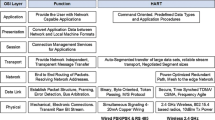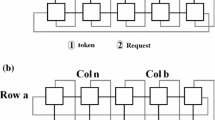Abstract
Scheduling a hard real time application on a token ring requires that the delays to capture the token be known. Previous studies considered only a small subset of the token ring mechanisms in schedulability analyses. In this paper, we study the influence of three types of faults on the time to capture the token. These are token losses, failures of the active monitor and cable faults. We also show the influence of the stack mechanism on the delay to capture the token. The paper ends with an evaluation of these delays in various ring configurations in which the transmission speed, token hold time and ring latency are variables. We conclude that the token ring may be very difficult to schedule for hard real time applications because we do not know if other mechanisms or combinations of phenomena can introduce additional delays that make the operation of the ring unpredictable in the present state of knowledge.
Similar content being viewed by others
References
Agrawal, G. et al. 1992. Guaranteeing Synchronous Message Deadlines in High Speed Token Ring Networks with Timed Token Protocol.Proc. of 12th IEEE Conf. on Distributed Systems, Yokohama, Japan, pp. 468–475.
Benel, R.A., Dancey, R.D., Dehn, J.D., Gutman, J.C. and Smith, D.M. 1989. Advanced Automation System Design.Proceedings of the IEEE, 77(11):1653–1660.
IEEE 1989. IEEE Standard 802.5-1989, Token Ring Access Method, IEEE, 1989.
Kopetz, H.et al.. 1989. Distributed Fault Tolerant Real-Time Systems: The MARS Approach.IEEE Micro, 9(1):25–40.
Le Lann, G. 1990. Critical Issues for the Development of Distributed Real-Time Computing Systems.Proc. of Second IEEE Workshop on Future Trends of Distributed Computing Systems. Cairo, Egypt, pp. 96–105.
Le Lann, G. 1992. Designing real-time dependable distributed systems.Computer Communications, 15(4): 225–234.
Pleinevaux, P. 1992. An Improved Hard Real-Time Scheduling for the IEEE 802.5.Journal of Real-Time Systems, 4(2): 99–112.
Rufino, T. and P. Verissimo, P. 1992. A Study of the Inaccessibility Characteristics of ISO 8802/4 Token Bus LANs.Proc. of IEEE INFOCOM'92. Florence, Italy.
Sha, L. and Sathaye, S. 1993. A Systematic Apporach to Designing Distributed Real-Time Systems.IEEE Computer, Sept. 1993, pp. 68–78.
Strosnider, J., Marchok, T. and Lehoczky, J. 1988. Advanced Real-Time Scheduling using the IEEE 802.5 Token Ring.Proc. of IEEE Real-Time Systems Symposium, Huntsville, Alabama, pp. 42–52.
Strosnider, J., Marchok, T. 1989. Responsive, Deterministic IEEE 802.5 Token Ring Scheduling.Journal of Real-Time Systems, 1(1): 133–158.
Yao, L. and Zhao, W. 1991. Performance of an Extended IEEE 802.5 Protocol in Hard Real-Time Systems.Proc. of IEEE Infocom'91, pp 469–478.
Author information
Authors and Affiliations
Rights and permissions
About this article
Cite this article
Pleinevaux, P. Real-time fault tolerant operation of the 802.5 token ring. Real-Time Syst 8, 79–91 (1995). https://doi.org/10.1007/BF01893146
Issue Date:
DOI: https://doi.org/10.1007/BF01893146




